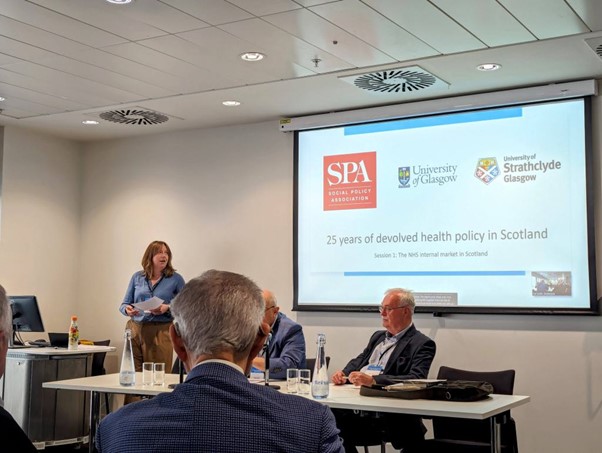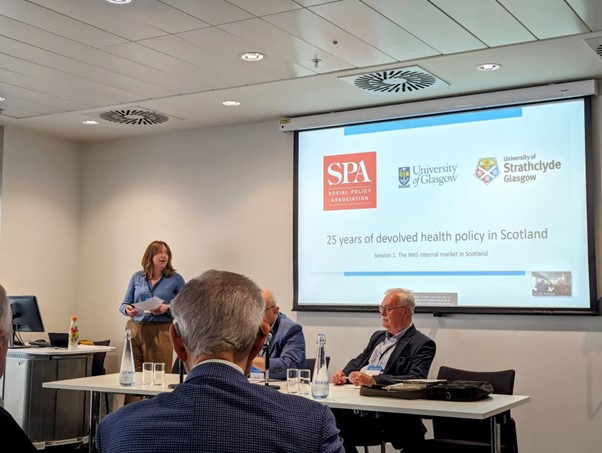Expanding methods for social policy research and engagement
Author: Ellen Stewart

Professor Ellen Stewart (left) speaking at ’25 years of devolved health policy in Scotland’
Unpicking how policy reforms are achieved is an essential part of advocating effectively for future social policy change, and so, therefore, is developing our methodological toolkit for this task. 2024 marked a quarter of a century since political devolution to Northern Ireland, Scotland and Wales, and health policy has been a key area of divergence in the intervening years. Our recent SPA Opportunity Grant sought to examine two major health policy reforms that took place in the first session of the reconvened Scottish Parliament: the abolition of the internal market in the NHS; and the introduction of smokefree public places, also known as ‘the
smoking ban’. We consider each of these to be ‘pathbreaking’ reforms, which significantly reshaped the landscape and set the tone for future changes.
We were both keen to bring new methods of researching policy change into our usual methods toolkits. Having been part of a witness seminar during a historically-oriented research project on charitable fundraising in the NHS, Ellen was intrigued by the method’s potential for social policy research. Kat had previously found witness seminar transcripts on The Black Report and the Health Divide and on public health in the 1980s and 1990s valuable data sources for her research examining policy responses to health inequalities.
Witness seminars are a distinctive approach pioneered by modern historians: combining group oral history of key people involved in historical moments, with a question & answer discussion with a selected audience. The whole proceeding is audio recorded, transcribed and approved by all participants, in order to generate a collective record of key moments, and this is published
online to create valuable data for future participants. Witness seminars therefore generate a new data resource for future researchers to use, while also creating a space in which, via facilitated discussion between key participants, new insights can emerge. The method is
particularly associated with the London School of Hygiene & Tropical Medicine’s Centre for History in Public Health, who hold an archive of seminars going back to 2000.
Ambitiously, and possibly foolishly, we chose to run both witness seminars on the same day in May 2024, allowing key people who had been involved across the reforms to participate in both sessions. The appeal of the method, compared to the months of individual ‘elite’ interviewing that both of us have often undertaken in previous projects, are multiple. We found people (including four former Ministers) very willing to take part, and to help with suggestions, introductions or nudges to other participants who we had struggled to track down in their retirement. While this preparatory work was considerable, in one day, we generated six hours of transcripts in which 12 participants spoke at length about their involvement in these reforms, with thoughtful interventions from the invited audience. Most participants came with some recollections prepared, some of which reflected their ‘standard’ account of the period.
However, these were consistently supplemented, queried and challenged by their former colleagues, political opponents or successors, all in good humour and often in ways that relied on insider knowledge we might have lacked as interviewers. As well as the quality of data generated, the events felt like something of a reunion, and the conversations both in the formal session, and in catering breaks, were lively. Witness seminars act as both data-generation, and engagement event.
Witness seminars are rooted in the oral history method. Compared with qualitative interviews, oral history interviews tend to be less structured, and more led by the interviewee’s account of a time period, than the analytical or critical angles an interviewer might want to draw out. There is a risk, of course, that this less structured approach renders the account of events descriptive and uncritical; an opportunity for people who have occupied positions of power to narrate events in ways that are flattering to them. While we found other participants and our audience willing to challenge any rose-tinted moments in the discussion, it requires careful chairing. The
risk of uncritical narratives is, we feel, mediated by our commitment to open access publishing the witness seminar transcript in full, as a record for researchers to interrogate as they wish.
The key drawback we came away reflecting on, concerned who wasn’t in the room. Some of this was about demographic representation. We ended up with entirely white panels of speakers, and while there were some women participants, it was far from gender balanced. This is broadly representative of the political class and senior civil service of the period in question, but we are
very conscious of the perspectives on these reforms which it might exclude. In terms of positions on the policy, we also struggled to identify and engage policy opponents, that is, people who unsuccessfully advocated against these reforms. The invitation might be especially unappealing when, as well as re-narrating one’s own failed opposition to a reform, one has to sit through others celebrating their successes.
Overall, both witness seminars were enjoyable events that contributed new information we had not previously known, and which (in contrast to many qualitative data sets) are now in the public domain, for others to use, via Strathclyde’s Centre for Health Policy website. Given this, we recommend others interested in major policy developments consider this method as an option,at least where the aim is to look back and consider what can be learnt from past policy reforms.
Acknowledgements: Please note that an earlier version of this blog was published on the Social Policy Association blog. With thanks to the Social Policy Association for the Opportunity Grant, held by Ellen Stewart and Kat Smith, that funded these witness seminars.
